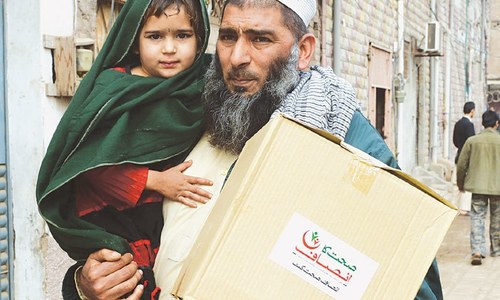Prime Minister Imran Khan on Saturday acknowledged that the recent hike in prices of essential commodities and their shortage was a result of his government's negligence.
Addressing the distribution ceremony for Sehat Sahulat Cards in Governor House Lahore, the prime minister said imports had become costlier after the rupee fell in value, which he attributed to soaring prices of "ghee and cooking oil".
"On the other hand, the hike in the prices of essentials was caused due to the government's negligence, and a proper investigation is being carried out in this regard," Khan said.
Editorial: Wheat crisis
Those who have benefited off the backs of people in need will be penalised, he vowed, adding that the government was trying to bring a system in place to anticipate such a situation in the future.
Lamenting the state of the economy his government inherited, the premier said: "When we assumed office, our imports were Rs60 billion while our exports were Rs20 billion. We had a trade deficit of Rs40 billion."
Earlier, the prime minister distributed health cards among attendees after which he began his speech amid roaring applause and cheers from party workers present on the occasion.
Addressing Punjab Health Minister Dr Yasmin Rashid, who was also among the guests, the premier congratulated her for providing health cards to five million families.
"I never said that we will make Pakistan an Asian tiger. I had said that we will make Pakistan a great nation, following in the footsteps of Madina. And the most important principle for Madina is humanity.
"Humanity means that a great nation takes responsibility for the people at the lowest level," he said, adding that the reason for making Shaukat Khanum Cancer Memorial Hospital was because he can never forget the face of a man at Mayo Hospital who was told he would have to buy yet more medication for his ailing brother.
"He used to work as a labourer during the day and used to spend his nights with his brother who was dying of cancer. That completely changed the course of my life. If I would have never seen the face of that man, then I would have never made the cancer hospital [...] and maybe never have entered politics.
"It was after that I decided to spend my life working for the people after my cricketing career. Therefore, the first time we [PTI] had a provincial government in Khyber Pakhtunkhwa, we initiated this health card system.
"The reason that the province gave us a second chance and a two-third majority [...] one of the biggest reasons for this was the health cards system. This was the first time they were introduced to the concept of a welfare state."
Calling out media channels, the premier said: "They go to unsuspecting citizens and ask if there is a hike in the prices of essentials. He replies yes, before they ask where did Naya Pakistan go, forcing him to say bad things [about the country]."
"This is being planned. The state of Madina was not built on the first day, it was a journey. For the first three to four years, the state was in great turmoil. Muslims had to face great difficulties. But then the tide turned, and it changed history. The distribution of these health cards is just another step in that journey," he said.
"For the first time, we have removed all duties on importing medical equipment because we want hospitals to be built, we don't have enough facilities. These health cards will bring a change in our healthcare system; we will give incentives to people for building hospitals, he added.
Referring to the controversial MTI reforms, the prime minister said that there was a dire need to sort out the management of healthcare facilities.
"The problem is that there is no accountability in government hospitals. The rich go to private hospitals, while the richer go to London for medical treatment," he said in an apparent reference to former prime minister Nawaz Sharif who is currently abroad for his medical treatment.
"This is not privatisation, this is autonomy. It is meant to improve the management structure of hospitals. With these reforms, government hospitals will be up to par with private sector healthcare facilities."
Calling out his naysayers, the premier said that the current Pakistan was the Pakistan that was originally envisioned. "I myself was not aware of the country's potential until I took office."
This country will be the nation where people will come to find employment, he concluded.
Before the premier, Punjab Health Minister Dr Yasmin Rashid and Punjab Chief Minister Usman Buzdar also addressed the gathering.
PM Imran meets Punjab CM
During his day-long visit to Lahore, Imran held a one-on-one meeting with Punjab Chief Minister Sardar Usman Buzdar where the two discussed the overall situation in the province and the pace of development projects, a press release by the prime minister's office said.
The prime minister began his Lahore visit by calling on the Punjab Safe City Authority headquarters where he was briefed on the scope of the project, and on making security effective through the project.
Punjab Governor Chaudhry Sarwar, the Punjab chief minister, and members of the provincial assembly were also present on the occasion. Imran also launched the global portal for the Police Khidmat Markaz.
PM Imran had last visited Lahore on Jan 26, and held a one-on-one meeting with the chief minister as well as with party MNAs and MPAs at the chief minister’s secretariat.
















































